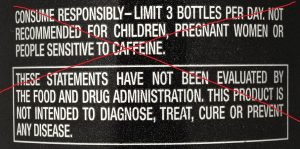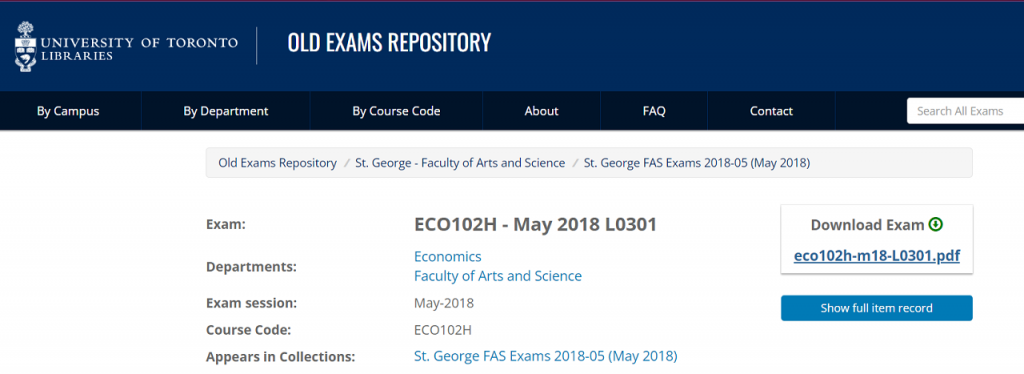
Develop Decent Study Skills
Do you have a strong belief in the academic performance enhancing power of any of these:
Of procrastination stress to motivate?
Of sugar to energize for hours on end?
Of caffeine to invigorate?
Of energy drinks to sustain?
Or cramming the night before to save exam day from a term of neglect?
None of these magic potions will help you pass ECO101 and 102.
To pass, you are going to need to develop better study habits. There is no other option.

This will mean trade-offs and opportunity costs. You may not be able to work as many hours at your part time job as you had hoped and will not be able to buy as many energy drinks as a result.
Fortunately, one of the goals of ECO101 is to support you in learning to think like an economist and this life scenario is a good starting point.
Here are three tools brought to you by the people who create, sustain, and operate ECO101 and 102 that will help you pass. Unlike energy drinks, they don’t need warning labels.
The syllabus (the course outline)
Pro Tip: Just forget about texting TLDNR for the rest of your academic career.
Latin might be a dead language, but the word syllabus refers to a living, breathing document. These course outlines can lead you through your timetable like a treasure map.
At least once, that has been literally true. To test if students were reading his course syllabus, a professor hid $50 on his campus and waited for someone to follow the instructions in the document and find the money. No one did. And no, this story is not an urban legend.
Read your economics course syllabus.
Read the syllabi for every single one of your courses. It outlines the course schedule with deadlines for specific assignments, the text materials, and online resources you’ll need to access. Sometimes in ECO101 the syllabus can even tell you about getting almost free marks, which can make a huge difference if you’ve got 62% and need 63% (hint: look for the note about the entry task).
The syllabus also gives you information about course or department processes and expectations. Some of this information may be obvious, like collaborating with classmates online during a quiz is cheating. Other pieces of information might introduce new ways of approaching problems. For example, only use your utoronto.ca email for university interactions and, even then, be mindful of what communications tool the instructional team wants you to use for which purpose.
The depth of detail contained in the syllabus means it is a dense and long document. As a university student, you’ll need to get used to those. And, while you should read all the syllabus, don’t memorize it. Just keep it where you can find it and refer back when you need to.
“Read the syllabus right away. The syllabus is just a wealth of information to start planning with,” said Thomas Blampied an Academic Advisor, Learning Strategies. “It enables you to block out time for course readings and to build out your review schedule for tests and exams around when you know your other assignments are due.”
Snoop Dogg thinks you should read your syllabus too.
A calendar
You need a calendar.
For some students, digital calendars with constant notification reminders work. Other people need to block out their time for each task on paper, using different colors of ink for each course.
It doesn’t matter what kind of calendar tool you use. What matters is that you learn how to manage your time.
Procrastination and faith in the powers of cramming the night before are barriers to success in ECO101 and ECO102. Luckily, procrastination and cramming are bad habits that can be changed, they are not personality traits. If you have ever relied on procrastination stress to motivate you, or passed due to cramming, the time to address the issue is now. Visit the Learning How to Learn site and scroll down to the Academic Success events calendar. There, you’ll find virtual sessions on Time and Energy Management and Time Management Boot Camps. Sign up.
If you’re not a habitual procrastinator or crammer, you may still need some support. For minor problems, check out this list of time management apps and tools compiled by Student Life.
Outlining when quizzes and tests are on a calendar is easy enough, but you do have several courses and all of them operate on roughly the same schedule. Think ahead and use your calendar to set a schedule during the first week of classes. You’ll start learning how to plan based on how long it takes you to complete the first reading, to get familiar with Quercus quizzes, the entry tasks module and getting to the questions and discussions on the Playback platform.
Falling behind in Economics 101 and 102 must be addressed early. Don’t let missing a week of readings become two weeks. There is help available and you should seek it out as soon as possible.
“Students should reach out for help if they feel like they are falling behind.,” said Alyssa Hughes, Undergraduate Assistant with the Department of Economics. “Emailing the course mailbox, connecting with their College Registrar or contacting the Department can make such a difference in accessing resources and available supports. Waiting until the end of term often results in limited options and even more stress that could be avoided.”
Here’s an excerpt from the Time Management Boot Camp by Student Success. Think about how much more of this kind of instruction you need. Sign up.
The practice resources
The more often you repeat something, the more likely to are to remember it. Applied to ECO101 and 102, that statement does not mean learning by rote or memorization.
“Students don’t need to memorize the textbooks, you need to apply what you are learning,” emphasized Professor Gazzale. “You shouldn’t spend too much time reading and re-reading the textbook. It’s more effective to treat the text, and all the other materials, as resources that help solve problems. Practicing and applying what you have learned is how successful students build a repository of knowledge to draw from.”
Every week’s materials include practice questions. These exercises help you to use new concepts and tools as you train yourself to start thinking like an economist. Do the questions. More importantly, ask about the practice questions during your tutorials, during TA or instructor office hours, and on the course platforms.
Once you have finished the practice questions, you can find more.

The Old Exams Repository at Robarts Library is probably the best-known resource for finding practice questions. Some students read two or three at the beginning of the course so they can identify themes and ideas that are repeated and, to some degree, reverse engineer their learning to meet the demands of the final exam. In its offices, the Arts and Sciences Student Union (ASSU) also keeps a physical bank of past tests donated by students.
Using practice materials that originate from the University of Toronto, and from your own instructors is important.
“When you come to my classes, watch my videos, and use my materials, you’re learning what I think is important and interesting about the course,” said Professor Gazzale. “When you’re reading and re-reading the textbook, you’re learning what other professors think is important and interesting about the subject.”
Where external materials matter, it’s to find more opportunities to apply the concepts of economics to understanding your own experience, your own economic situation, and to understanding global or societal situations. There’s more about how you and your classmates can prepare to work together on this aspect in lesson 3 of the guide.
Pro tip: Sit in roughly the same place every lecture session. The strangers you sit near in class, won’t stay strangers.
“My biggest piece of advice for ECO102 is to read the textbook. It’s lot more theory-based than ECO101 and it’s really about understanding the concepts,” said second-year student Bruno Sullivan who completed the courses last year. “For both classes, I’d suggest studying with friends so you can ask each other hypotheticals. I also did a lot of past exams, which really helped. Also, this is more specific, but I drew graphs for everything because it’s a good way to visualize how the concepts work.”
The syllabus, a calendar and practice resources are the three tools you need in your kit to help you form strong study skills. The next step to managing Economics 101 and 102 is to start building a course community.
Thriving, already? On to The Thrive Guide Lesson Three.
